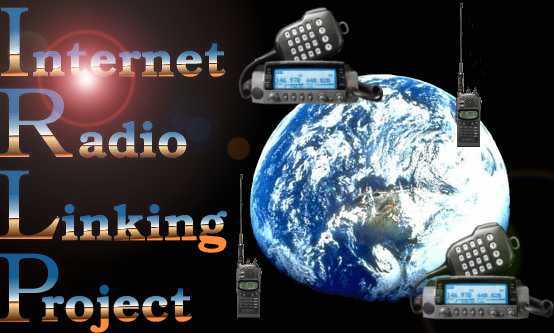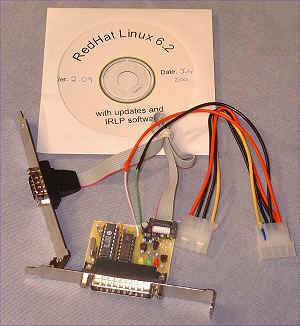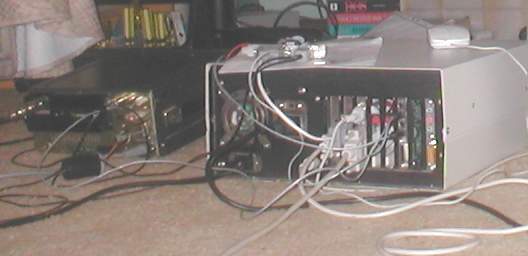
VK3HJQ


IRLP Page

IRLP stands for the Internet Radio Linking Project. The aim of this project is to link radio systems separated by long distance without the use of expensive leased lines, satellites, or controllers.
The IRLP uses Voice-Over-IP software and the power of the Internet to link your radio site to the world. The system uses its own custom interface board and software suite which makes interfacing your radio system to the world simple and cost effective.
The IRLP runs a large network of dedicated servers and nodes to offer the very best in voice communications. The heart of the IRLP is its Amateur Radio network which reaches hundreds of towns and cities across the world, linking them all with a full dynamic range, telephone quality sound.
DTMF Codes for Local IRLP Nodes
VK3NRE Node 6380 Albury/Wodonga
Now on ADSL at the Home QTH of Peter vk2cim in Albury.
7 simple steps to make a connection on Node 6380
1. Listen first 15-30 seconds before Txing.
2. Announce: " Is the repeater currently in use"
3. Announce eg. " VKxxxx for the Wagga Node or Node 6260 "
3a. Key in the DTMF code. 6260
4. Once connected and after hearing the Voice ID wait at least 15 seconds.
5. Press the PTT and hold for 3 seconds before txing and announce your presence.
6. Have a QSO, and most important leave 3 seconds between overs.
7. Announce " VKxxxx i intend to drop the link "
7a. Key in the DTMF code. 73
Please remember to always announce your call sign before sending any DTMF codes.
Node 6380 Albury/Wodonga vk3rne 70cm DTMF codes
Connect link to a node (i.e 6260 Connects you to the Wagga node)
73- Disconnects link from a node
#0 - Node Status
#2 - Local Time
#3 - UTC
#1 - Albury Local Current Weather Forecast
#*10# - Last Connected Node
##xxxx - Play Remote Time ( xxxx is the node number )
These codes are subject to change at any time without notice :-)
Node 6260 Wagga Wagga vk2rwg 2mt DTMF Codes
#0 - Node Status
#2 - Local Time
#3 - UTC
#*10# - Last Connected Node
#000 - Weather Menu
#001 - xxx Weather
#002 - xxx Weather
#003 - xxx Weather
#004 - xxx Weather
73 - Disconnect Link
789 - Local Time
#*** - Connect to RANDOM node (global)
#6** - Connect to RANDOM VK or ZL node
Here is a
list of Special DTMF codes used on the Wagga node. Send these codes (in
the same transmission) to hear or use the following:
123 Plays the current time
#123 Activates a Parrot repeater (only when node is enabled)
#001 Current Albury Weather
#002 Current Griffith Weather
#003 Current Gundagai Weather
#004 Current Tumbarumba Weather
#600 Current Penrith Weather
#610 Current Perth Weather
#626 Current Wagga Weather
#648 Current Cairns Weather
#650 Current Adelaide Weather
#680 Current Darwin Weather
Have a play!
These codes are subject to change at any time without notice :-)
The Current List
of IRLP Nodes & there Status
Click here http://status.irlp.net
Making an IRLP Connect.
Internet Radio Linking Project is very easy and intuitive to use, the system gives messages about each action. When you link, when you unlink, when the node you are calling is busy, in use, or offline etc.
Please make sure you listen carefully to the voice prompts so you know what is happening.
To use the system you need a radio with DTMF capabilities and secondly you need good access into your local IRLP Node.
Once you have met these requirements you are nearly set to go. Your next step is to listen on one of the repeaters that carries IRLP traffic and get into the swing of how the system works.
ALWAYS before speaking or transmitting please LISTEN to ensure the system is not in use, if you would like to check if a link is in progress after not hearing traffic, use DTMF "0". This will announce link active or inactive.
If no-one is using the system or their is no active link you can use the system., Announce your call sign followed by the node name or number you wish to call then DTMF node code, this will bring a link up. The 73 is used to cancel the link. After canceling a link please announce your call sign on the local repeater.
As an example say you wanted to connect to VK2RWG in Wagga, you would announce your call sign eg. VKxxxx for the Wagga Node then type 6260 providing there were no errors you would hear the announcement when the connection is established. To bring the link down announce your call sign eg. VKxxxx i intent to drop the link and then type 73.
Some common codes, check with your node owner for a list of your local node codes.
DTMF 0 or #0 - to check IRLP link status
DTMF #2 - to check the time (local time)
DTMF #3 - to check the time (UTC)
Some general rules.
1. Always listen on the repeater first to make sure a QSO is not in progress or the
system is not linked to another IRLP Node or Reflector.
2. Identify before sending DTMF codes and trying to use the IRLP Node.
3. Leave breaks of around 2-3 seconds when in QSO to another repeater,
and leave breaks of around 5 seconds when using a reflector,
so other stations have time to join in if necessary.
4. Do not link to another node and then unlink without saying anything,
this really annoys people on the other end, please put out a call.
5. When using reflectors leave plenty of breaks, please be aware that many repeaters
may be tied into a reflector. Reflector 2 is mainly used like a call channel and for
quick fire QSOs, listen for a while to get the flow of the system.
Generally the other reflectors are fairly quiet and can be used for skeds etc.. So if you feel like
having a big roundtable discussion swap to a reflector other than ref2.
6. Use phonetics when giving your call sign and name.
7. Do not mention IRLP codes
when talking to other amateurs via the IRLP system. Some Nodes are open
nodes, but many nodes are closed and need special pre access codes to
be able to use the system. If someone asks you for information
regarding their local IRLP system, please tell them to find the local
repeater owner, operator or club to get further information.
And lastly the IRLP system is an International network, if you have a
hard time understanding some of the accents on the system, imagine the
problems for operators at the other end !!
Please be courteous to all hams at all times when using IRLP.
Please Note; The above guidelines may differ from those provided by your local Node operator.
These notes are only a guideline, and at NO time should take precedence over the wishes of your local Node sponsor.
John vk3hjq.
Albury / Wodonga IRLP
http://www.qsl.net/vk3kqu/irlp.htm
Wagga Wagga IRLP
http://www.qsl.net/vk2wg/VK2WAG-irlp.html
The Australian IRLP Homepage.
The home of IRLP
For more info, software & controller board for your own Node.
In Australia please contact
Peter vk2yx pete@jbo.com.au part of the International IRLP installation team.

The wait is OVER! IRLP version 3.0 is here!
Click on image for a high resolution picture
IRLP Ver 3.00 I/O Interface Board
Adobe Acrobat Reader is required to view/print the PDF documents on this page.
If you don't have Acrobat Reader, download it from here:
Peter vk2yx IRLP Presentation
IRLP Operating Guidelines page
Please download and read this pdf file.
Voice & IRLP Repeater Guidelines WIA VIC:
Please download and read this pdf file.
Australian & NZ Nodes & Frequency
Node No. Callsign Location Frequency
6000 VK2RBM Sydney 147.050+
6010 VK2RMP Wollongong 146.850-
*** VKRIS Nowra 146.975-
*** VK2RBT Bateman's Bay 146.675-
6020 VK2RMB Terry Hills 146.875-
6030 VK2RMR Mt Riverview 439.575-
6040 VK2RTZ Newcastle 146.775-
6050 VK2RCZ Sydney 439.425-
6060 VK2RAG Gosford 438.075-
6100 VK6RNC Perth 146.625-
6110 VK1RBM Canberra 438.025-
6200 VK6RFM Fremantle 146.950-
6210 VK2TTA Wahroonga 439.250s
6220 VK2RIC Lismore 438.675-
6240 VK2SRS Cooma 147.375+
6250 VK2ROT Paddington 438.575- Tone 123Hz
6260 VK2RWG Wagga Wagga 147.125+
6300 VK3RGL Melbourne 147.000-
6310 VK3RWA Western Vic 147.100+
6320 VK3RRU Merbein 438.525-
6330 VK3RPU Arthur's Seat 439.725- Nat
6340 VK3DRB Mt. Waverley 146.475s
6350 VK3RMH Melbourne 438.325-
6360 VK3ROU Olinda 438.225-
6370 VK3RSH Swan Hill 146.900-
6380 VK3RNE Albury-Wodonga 439.425-
6390 VK3JED IRLP-Experim'I 146.550s
6400 VK4RGC Brisbane 147.050s
6410 VK4FC Bundaberg 147.800-
6420 VK4SX Bundaberg 438.775-
6430 VK4CCV Brisbane 146.875-
6480 VK4RCA Cairns 146.950-
6500 VK5RAH Adelaide Hills 146.775-
*** VK5RSA Adelaide City 438.025-
6510 VK5RAC Port Lincoln 146.750-
6600 VK6AMS Karratha 146.700-
6610 VK6RAL Albany 146.725-
6620 VK6XAA Collie 146.900-
6700 VK7AX Ulverstone 146.750-
6710 VK7DY Tea Tree 147.875-
6720 VK7HTW Murdunna Down
6800 VK8ZAB Darwin 146.850s
6900 ZL3TMB Christchurch 147.200+
6910 ZL2LD Wellington Rgn 146.725-
6920 ZL2WKI Palmerston Nth 146.825-
6950 ZL1BQ Auckland 146.700-
IRLP Nodes Down Under
VK Map
Click here http://www.ipass.net/~jimprice/irlp/vkmap.html
You need either,
( Dual Tone Multiple Frequency )
OR
DTMF key Pad for your computer Instructions ------------ The key pads generates all the normal DTMF tones to control your local IRLP node. To Edit the memories click on mem and change what ever you want.
Clicking on OK saves the file and returns you to the key pad.
Mouse or Buttons
----------------
You can either click on the button for tone you require or use the numeric
part of your keyboard. As there is no hash "#" key the dash "-" key was used instead.
Program written thanks to Robin Stephens G8XEU using Visual Basic.
Click here to download dtmffile.zip
At the moment I am the node owner of vk3rne, number 6380. If you have access to an IRLP node then please give me a call. The node is only on some of the time at the moment, but this is something I hope to change.
When I began setting up my node, I thought that it was going to be extremely difficult but now that I am at the end of it all I think that it was very simple because there wasnít really much involved and I can only say to you that if you are going to set up a node and are finding it difficult then just keep with it because it isnít really that hard once you know how. I hope that this page will help you.
The only thing that you need to know is what the node number is on the station you would like to call, for example if you wanted to access my node then you need to dial 6380 and then you should get the link on message. Also there are many other features, one includes the 73 tones. If you dial this is should disconnected any node. For all of the other nodes you may need to ask the SySop for the tones (SySop stands for system operator)
Well to begin with, IRLP runs on a operating system called Linux. You might right now be going "Ohhhhhhh" But after you get the hang of things you will realize why. First thing that you will need to do is to install this system. At first you will have a lot of problems with this and most likely have many goes at it. The only advise that I can give you is to try your hardest because you will get it in no time at all and then you will see just how simple it is. Also if you have really hit a stump then I could only suggest that you search the internet for someone who will know. You can e-mail me if you wish but keep in mind that I am relatively new to all of this.
Now you have got Linux installed that is that hardest part over with because the rest has some type of guide to help you along with it. So the first thing to do is to install the internet. I would also suggest that you use Linux Red Hat and the later the version the better. Now there will be a little difference between versions but I will try to help everyone. If it is an earlier version then you need to go to the network configuration, sometimes in the control panel. There, there will be a interface tab. There click on add and you will be looking for the PPP interface. This is an abbreviation for Point-to-Point Protocol. If you cant find this then don't worry because it most likely means that you have a later version so if so then have a look on the desktop because from about 7 onwards there is a setup icon there. Go to this and follow the guide. Now you can try to connect. There is a X tool called Usenet and this will have a list of interfaces. Yours should be there. Click on it and it should connect.
I GET DISCONNECTED APROX 30 SECONDS AFTER CONNECT
This is most likely that the Authentisication isn't working. Try checking your username and password.
I CANT BROWSE THE INTERNET, BUT IT DOES STAY CONNECTED
This could be a few problems. First you need to enter the DNS IP addresses into the Linux configuration that also may be in control panel. If this doesn't work then try typing it in ifconfig into the terminal programmed, and the PPP0 should come up. If this does then have a look at the IP address. It should be 203... something. If you get a 10... address then you need to delete the PPP setup and reinstall it. Now anything beyond this and I cant help you.
Now that you have done this you only need to setup a sound card and I would suggest that you use a Creative Sound blaster of some kind to make things easy for yourself, and the audio quality is extremely good. Now this part should be relatively simple. Open a terminal session and enter in sndconfig and this will probe for a sound card. You may need to know the DMA, IRQ and IO, if you don't then you will need to find out somehow. You just need to make sure that you can hear all of the audio samples played. I would suggest that you make sure that there is only one card in your computer and this probe should do all of the work for you.
Now this is the easy part (and I have assumed that you have bought the IRLP board from David Cameron All that you need to do is to contact a install person who will ask you for your:

The above picture is my home node that runs on the VK3RNE repeater located at Albury and Wodonga. The node number is 638, but unfortunately it is only operational some of the time however there are plans at the moment to have this setup become more permanent.
You can e-mail the installs@irlp.net for your local install person. It will take approx. one hour. After you get this, all that you need to do is to wire up the IRLP board and a radio. Then IRLP away.
Email lorian@netc.com.au
VK3HJQ Home Page

© vk3hjq 2001-2022 All Rights Reserved. vk3hjq@hotmail.com